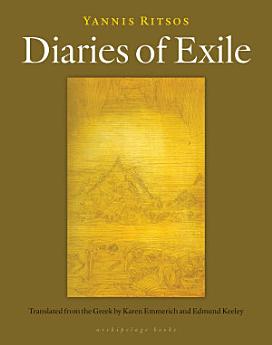Diaries of Exile
មករា 2013 · New York Review of Books
សៀវភៅអេឡិចត្រូនិច
120
ទំព័រ
family_home
មានសិទ្ធិ
info
reportការវាយតម្លៃ និងមតិវាយតម្លៃមិនត្រូវបានផ្ទៀងផ្ទាត់ទេ ស្វែងយល់បន្ថែម
អំពីសៀវភៅអេឡិចត្រូនិកនេះ
Yannis Ritsos is a poet whose writing life is entwined with the contemporary history of his homeland. Nowhere is this more apparent than in this volume, which presents a series of three diaries in poetry that Ritsos wrote between 1948 and 1950, during and just after the Greek Civil War, while a political prisoner first on the island of Limnos and then at the infamous camp on Makronisos. Even in this darkest of times, Ritsos dedicated his days to poetry, trusting in writing and in art as collective endeavors capable of resisting oppression and bringing people together across distance and time. These poems offer glimpses into the daily routines of life in exile, the quiet violence Ritsos and his fellow prisoners endured, the fluctuations in the prisoners’ sense of solidarity, and their struggle to maintain humanity through language. This moving volume justifies Ritsos’s reputation as one of the truly important poets in Greece’s modern literary history.
អំពីអ្នកនិពន្ធ
One of Greece’s most prolific and widely translated poets, Yannis Ritsos (1909-1999) was born in Monemvasia. He lost his mother and an older brother to tuberculosis when he was young, and later contracted the disease himself. A lifelong, committed Communist, he fought in the Greek Resistance to the Axis occupation, sided with the Communists in the Greek Civil War, and subsequently spent years in detention centers and camps for political prisoners. The dictatorship of 1967-1974 landed him in internal exile yet again. Despite these many obstacles, Ritsos wrote more than a hundred volumes of poetry, plays, and translations. In 1976 he was awarded the Lenin Peace Prize.
Karen Emmerich’s translations from the Greek include books by Margarita Karapanou, Amanda Michalopoulou, Ersi Sotiropoulos, and Vassilis Vassilikos. Her translations of Poems (1945-1971) by Miltos Sachtouris was nominated for a National Book Critics Circle Award in Poetry. She has received translation grants and awards from PEN, the National Endowment for the Humanities, and the Modern Greek Studies Association. She is on the faculty of the Department of Comparative Literature at the University of Oregon.
Edmund Keeley is the Charles Barnwell Straut Professor of English Emeritus and the Director Emeritus of the Creative Writing Program at Princeton University. His collaborative translations of the modern Greek poets, including C. P. Cavafy and the Nobel laureates George Seferis and Odysseas Elytis, received the PEN/Ralph Manheim Medal for Translation, and his translations of Yannis Ritsos earned him the Harold Morton Landon Translation Award of the Academy of American Poets and the First European Prize for the Translation of Poetry. In 1999 he received an Academy Award in Literature from the American Academy of Arts and Letters.
Karen Emmerich’s translations from the Greek include books by Margarita Karapanou, Amanda Michalopoulou, Ersi Sotiropoulos, and Vassilis Vassilikos. Her translations of Poems (1945-1971) by Miltos Sachtouris was nominated for a National Book Critics Circle Award in Poetry. She has received translation grants and awards from PEN, the National Endowment for the Humanities, and the Modern Greek Studies Association. She is on the faculty of the Department of Comparative Literature at the University of Oregon.
Edmund Keeley is the Charles Barnwell Straut Professor of English Emeritus and the Director Emeritus of the Creative Writing Program at Princeton University. His collaborative translations of the modern Greek poets, including C. P. Cavafy and the Nobel laureates George Seferis and Odysseas Elytis, received the PEN/Ralph Manheim Medal for Translation, and his translations of Yannis Ritsos earned him the Harold Morton Landon Translation Award of the Academy of American Poets and the First European Prize for the Translation of Poetry. In 1999 he received an Academy Award in Literature from the American Academy of Arts and Letters.
វាយតម្លៃសៀវភៅអេឡិចត្រូនិកនេះ
ប្រាប់យើងអំពីការយល់ឃើញរបស់អ្នក។
អានព័ត៌មាន
ទូរសព្ទឆ្លាតវៃ និងថេប្លេត
ដំឡើងកម្មវិធី Google Play Books សម្រាប់ Android និង iPad/iPhone ។ វាធ្វើសមកាលកម្មដោយស្វ័យប្រវត្តិជាមួយគណនីរបស់អ្នក និងអនុញ្ញាតឱ្យអ្នកអានពេលមានអ៊ីនធឺណិត ឬគ្មានអ៊ីនធឺណិតនៅគ្រប់ទីកន្លែង។
កុំព្យូទ័រយួរដៃ និងកុំព្យូទ័រ
អ្នកអាចស្ដាប់សៀវភៅជាសំឡេងដែលបានទិញនៅក្នុង Google Play ដោយប្រើកម្មវិធីរុករកតាមអ៊ីនធឺណិតក្នុងកុំព្យូទ័ររបស់អ្នក។
eReaders និងឧបករណ៍ផ្សេងទៀត
ដើម្បីអាននៅលើឧបករណ៍ e-ink ដូចជាឧបករណ៍អានសៀវភៅអេឡិចត្រូនិក Kobo អ្នកនឹងត្រូវទាញយកឯកសារ ហើយផ្ទេរវាទៅឧបករណ៍របស់អ្នក។ សូមអនុវត្តតាមការណែនាំលម្អិតរបស់មជ្ឈមណ្ឌលជំនួយ ដើម្បីផ្ទេរឯកសារទៅឧបករណ៍អានសៀវភៅអេឡិចត្រូនិកដែលស្គាល់។




